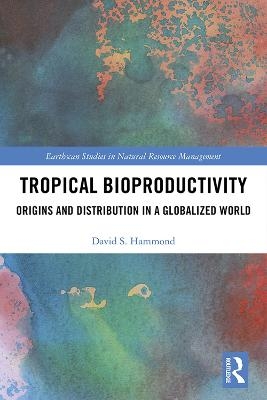
Tropical Bioproductivity
Routledge (Verlag)
978-1-138-59460-9 (ISBN)
This book investigates the fundamental role that tropical bioproductivity - or more specifically net primary productivity - has played in shaping the global geographies of food, finance, governance and people.
The book examines the basic astronomical and thermal properties of our planet to illustrate the dynamic nature of the tropics and how the region resides at the very heart of global energetics, driving the environmental flows that shape planetary climate and bioproductivity. The author explores how the region’s relatively small, but hyper-productive, land area provided the groundswell for the economic, social, political and demographic changes that fuelled empires, European colonialism and nation-building. Also covered are discussions on how the critical intake of capital needed to fuel the industrial and technological revolutions driving modern globalization was first expropriated from the tropics by harnessing the region’s natural productivity and biological crop diversity and then transforming it into tradeable commodities using the inhabitants' labour and knowledge. With modern tropical nations accounting for the bulk of people living in poverty and registering some of the highest income disparities, the author presents cross-cutting evidence showing that their histories and the persistence of expropriating institutions have fostered anocratic tendencies, poor governance, unorthodox financial flows and mass migration.
Tropical Bioproductivity cuts across vast geographies, topics and histories to deliver a readable narrative that links people, places and events with the environmental mechanics of our planet. It will be of interest to students and researchers in the areas of environmental studies, economics, history, agriculture, anthropology and geography.
David S. Hammond is Principal, NWFS Consultancy, based in Ashford, Kent, UK and Portland, Oregon, USA. He has undertaken environmental projects in a dozen countries in Latin America, Asia and Africa for clients such as WWF-UK, UNDP, UK DFID, IUCN and the Inter-American Development Bank. He was previously at the Iwokrama International Centre in Georgetown, Guyana, CABI Bioscience and Imperial College, UK.
Preface Part I Structure, Origins and Distribution 1. Two Tropics 2. Planet’s Powerhouse 3. The Blue and the Green Part II Exchange and Globalization 4. An Icelandic Banana 5. The Great Crop Swap 6. Sweet Salt and the Tropical Trade 7. Productivity’s Promise Part III Modern Consequences 8. Smaller, Younger, Poorer 9. The Braided Flow of Resources, Money and People
| Erscheinungsdatum | 21.01.2019 |
|---|---|
| Reihe/Serie | Earthscan Studies in Natural Resource Management |
| Zusatzinfo | 6 Tables, black and white; 28 Halftones, black and white; 34 Illustrations, black and white |
| Verlagsort | London |
| Sprache | englisch |
| Maße | 156 x 234 mm |
| Gewicht | 720 g |
| Themenwelt | Naturwissenschaften ► Biologie ► Botanik |
| Naturwissenschaften ► Biologie ► Ökologie / Naturschutz | |
| Technik ► Umwelttechnik / Biotechnologie | |
| Weitere Fachgebiete ► Land- / Forstwirtschaft / Fischerei | |
| ISBN-10 | 1-138-59460-1 / 1138594601 |
| ISBN-13 | 978-1-138-59460-9 / 9781138594609 |
| Zustand | Neuware |
| Haben Sie eine Frage zum Produkt? |
aus dem Bereich


